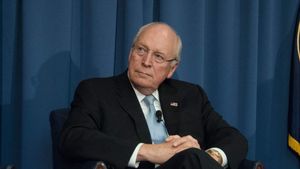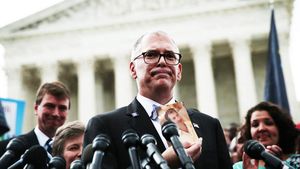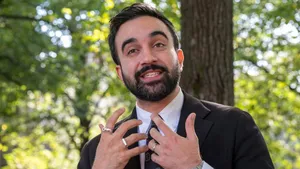Treatment GuideJust DiagnosedSex & DatingAfrican AmericanStigmaAsk the HIV DocPrEP En EspañolNewsVoicesPrint IssueVideoOut 100
CONTACTCAREER OPPORTUNITIESADVERTISE WITH USPRIVACY POLICYPRIVACY PREFERENCESTERMS OF USELEGAL NOTICE
© 2025 Pride Publishing Inc.
All Rights reserved
All Rights reserved
By continuing to use our site, you agree to our Privacy Policy and Terms of Use.
HIV infection rates could be substantially reduced in the United States if prevention funds were focused on more cost-effective strategies, according to a new study. For more than a decade approximately 40,000 people in the United States have become infected with HIV each year. The study, conducted by the Santa Monica, Calif.'based nonprofit research organization Rand Corp., used a mathematical model to determine the most cost-effective way to implement a $400 million budget targeted at decreasing these new HIV infections. The mathematical model identified nine HIV interventions that when used together might prevent close to 21,000 new HIV infections a year. The researchers then assessed the cost-effectiveness of the Centers for Disease Control and Prevention's initiative Advancing HIV Prevention. They found that the CDC's initiative would prevent an estimated 7,300 new HIV infections annually using the same $400 million budget. The mathematical model illustrates that 'if the funds that are available for prevention could be allocated more strategically, it could make more of a difference,' says Deborah Cohen, Ph.D., a Rand senior natural scientist and lead author of the study. The study report, titled 'Cost-effective Allocation of Government Funds to Prevent HIV Infection,' appears in the July/August edition of the health-policy journal Health Affairs. The CDC's Advancing HIV Prevention emphasizes four strategies for reducing HIV infection: incorporating HIV counseling and testing into routine medical care, expanding HIV counseling and testing opportunities, prevention-for-positives programs, and decreasing mother-to-child HIV transmission. The Rand study found that HIV counseling and testing, which is the mainstay of this new initiative, is the least cost-effective prevention strategy. According to the study, the most cost-effective ways to reduce HIV transmission include community mobilization efforts targeting men who have sex with men, needle-exchange programs, mass media campaigns with tested prevention messages, and free condom distribution programs. These are the types of programs that community planning groups were focusing on six years ago, according to Cynthia Gomez, Ph.D., codirector of the Center for AIDS Prevention Studies at the University of California, San Francisco. 'This analysis shows that we were on the right track,' she says. 'But we have been moved in another direction.' This other direction, some HIV advocacy groups and researchers say, is one that emphasizes a medical model of HIV prevention over a community-based approach. 'The CDC has backed away from interventions that are controversial, and the government doesn't want to support needle exchanges,' Cohen says. 'But those would be cost-effective programs. They've also backed away from targeting men who have sex with men with explicit campaigns and advertising'which potentially could make a big difference.' The programs that we know work 'are not part of what the CDC is emphasizing,' says Robert McMullin, executive director of the Stop AIDS Project, which uses community mobilization techniques to prevent HIV transmission among gay and bisexual men in San Francisco. Matthew McKenna, MD, MPH, deputy director for science in the CDC's Divisions of HIV/AIDS Prevention, says the CDC agrees that cost-effectiveness analyses are important. He adds, though, that by focusing solely on the Advancing HIV Prevention initiative the Rand study overlooks the other HIV prevention efforts that the CDC funds. 'Advancing HIV Prevention is only a fraction of what we are doing,' he says. 'The CDC has a wide range of activities that match up nicely with those things recommended as being cost-effective.' Furthermore, cost is only one determinant of a program's effectiveness, another researcher points out. 'Spending a lot of money on counseling and testing might not be the most cost-effective strategy,' says Ralph DiClemente, Ph.D., associate director of the Atlanta-based Emory Center for AIDS Research. 'But it will pick up people with an HIV infection, and those people could be counseled and linked to care, which may avoid or reduce their risk of infecting others, and that's not factored into [the Rand researchers'] calculations.' DiClemente also emphasizes the need to take a step back and look at an issue that has troubled HIV prevention advocates and researchers for years: the amount of money the government allocates to HIV prevention. 'Prevention is today's AIDS vaccine,' DiClemente says. 'So why is it, as the authors of the study point out, that only 10% of all government funding for HIV goes to HIV prevention when this is clearly a preventable epidemic?'
From our Sponsors
Most Popular
BREAKING: Supreme Court rules to save free access to preventive care, including PrEP
June 27 2025 10:32 AM
Thanks to U=U, HIV-positive people can live long, happy, healthy lives
July 25 2025 2:37 PM
The Talk: Beyond the exam room
August 13 2025 3:15 PM
Plus: Featured Video
Latest Stories
Amazing People of 2025: Javier Muñoz
October 17 2025 7:35 PM
It’s National PrEP Day! Learn the latest about HIV prevention
October 10 2025 9:00 AM
“I am the steward of my ship”: John Gibson rewrites his HIV narrative
September 16 2025 2:56 PM
“So much life to live”: Eric Nieves on thriving with HIV
September 03 2025 11:37 AM
The Talk: Owning your voice
August 25 2025 8:16 PM
The lab coat just got queer
August 21 2025 10:00 AM
Messenger RNA could be the key to an HIV vaccine — but government cuts pose a threat
August 20 2025 8:02 AM
The Talk: Navigating your treatment
August 01 2025 6:02 PM
The Talk: Starting the conversation
July 25 2025 4:47 PM
How the Black AIDS Institute continues to fill in the gaps
July 25 2025 1:06 PM
“I felt like a butterfly”: Niko Flowers on reclaiming life with HIV
July 23 2025 12:22 PM
Dancer. Healer. Survivor. DéShaun Armbrister is all of the above
July 02 2025 8:23 PM
1985: the year the AIDS crisis finally broke through the silence
June 26 2025 11:24 AM
VIDEO: A man living with HIV discusses his journey to fatherhood
June 10 2025 4:58 PM
Trump admin guts $258 million in funding for HIV vaccine research
June 03 2025 3:47 PM
Grindr is reminding us why jockstraps are so sexy and iconic
May 02 2025 5:36 PM
HRC holds 'die-in' to protest Trump health care cuts
April 28 2025 2:11 PM
Two right-wing Supreme Court justices signal they may uphold access to PrEP and more
April 21 2025 4:10 PM



































































